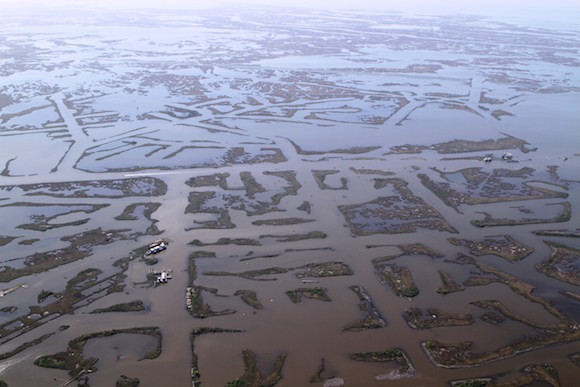There is no more important issue regarding the future of New Orleans, the State of Louisiana, and the Gulf of Mexico region than climate change. I have just arrived in France to be near the ongoing United Nations Climate Conference, or COP21. It’s a way to stand united with those from around the world who are facing the same crisis as Louisiana.
I have come to Paris because I was born and raised in New Orleans, grew up fishing and canoeing in Louisiana’s bayous and creeks and visiting family all across the greater Gulf Coast. In the aftermath of Hurricane Katrina I spent time on boats navigating city streets, listening for the voices of those trapped in attics, and seeing dead people awash in the floodwaters or tied to stop signs so the bodies couldn’t drift away.
I am in Paris because in 2010 I spent countless days and hours on boats, planes and on foot documenting the devastating impacts of the BP disaster.
I’m here because I will never forget seeing dolphins covered in oil and the horrific sounds they made as they gasped for air only to breathe in toxic fumes.
I’m here because the oil and gas industry has helped decimate Louisiana’s wetlands, greatly increasing New Orleans’ vulnerability to storms and rising seas, indeed jeopardizing our very existence.
I’m here because untold hundreds of millions of gallons of oil has leaked into the Gulf, not all of it from BP’s Macondo well. I regularly search for and report leaking pipelines, wells, platforms and other dangerous infrastructure.
I’m here because of the destruction of sensitive offshore fish habitat, including coral reefs and coastal wildlife refuges like Pass-a-l’Outre in Plaquemines Parish.
I’m here because of the countless dead and contaminated marine animals I see, among them sea turtles and pelicans.
I’m here because our beaches and barrier islands have been contaminated and are disappearing.
I’m here because of the 2010 deployment of millions of gallons of toxic dispersants by BP, seemingly in defiance of the EPA. And despite the public demand for a ban, these poisons are still being stockpiled and will be used again.
I’m here because every day the fossil fuel industry is dumping an unknown amount toxic fracking waste into the Gulf’s waters without testing its impact on marine life.
I’m here because of the 27,000 abandoned oil wells in the Gulf and because no one is monitoring the many that are leaking.
I’m here because I’ve seen shrimp with no eyes and strange tumors and would like to eat shrimp poboys without wondering if I’m killing myself.
I’m here because many of our coastal communities have been devastated over and over again and some of our most unique cultures are washing away. As tough and stubborn as South Louisiana people can be, everyone has their breaking point. Or should I say “tipping point,” which many of the world’s best climate scientists say we’ll soon reach — if we haven’t already.
I’m here because of destroyed family businesses, devastated families, suicides, sick, dead, or dying clean-up workers, and because family friends are so clearly expendable when the price of oil dips. (Notice how Big Oil always paints environmental activists as tree-hugging, job killers and then kills the jobs itself every time the oil glut threatens industry profits.)
I’m here because the BP debacle, combined with a state Legislature and Congress for sale to the biggest donors, has destroyed public faith in government.
I’m here because the fossil fuel industry has captured our environmental regulatory agencies and completely hijacked democracy.
And I’m here for deeply personal reasons. Watchdogging the oil and gas industry has taken a psychological toll, and I need to heal.
I’m here because the coal export facilities along the Mississippi River are illegally discharging coal and petroleum coke into the river and nearby wetlands and exporting the carbon emissions that will destroy our climate future.
I’m here because of environmental racism in towns like Mossville, Garyville, Phoenix, Ironton, St. Rose, and too many others to list.
I’m here because oil is still flowing freely from a Taylor Energy Co. platform toppled by a 2004 hurricane, and I’m tired of looking at it.
I’m here because the industry is lying about the hazards of offshore drilling and flat out ignoring the recommendations of the National Oil Spill Commission set up after BP.
I’m here because the Cat Island Pelican Rookery in Barataria Bay no longer exists, thanks to BP’s crude oil killing the mangroves that once held the soil in place.
I’m here because I am embarrassed that the New Orleans Jazz and Heritage Festival is presented by Shell, despite what they’ve done to the Niger Delta and our very own wetlands.
I’m here because it makes me cringe to see Drew Brees and the New Orleans Saints wearing practice jerseys with the Chevron logo, despite what Chevron has done to the Amazon and our very own wetlands.

And I’m here for deeply personal reasons. Watchdogging the oil and gas industry has taken a psychological toll, and I need to heal. I need to be surrounded by people who are sharing in the struggle and who can hear my anger and see my tears without making me feel awkward or weak.
I’ve brought photos and video that document the ravages of the fossil fuel industries and the destruction of wetlands in places like Lafourche Parish near Golden Meadow and the Lafitte oil fields, and let me tell you, it’s not pretty.
Finally, I’m here because I want to apologize to the rest of the world for what my own state and nation are doing to the planet.
Jonathan Henderson, JD, MBA is the founding director of Vanishing Earth. Prior to launching Vanishing Earth in 2015, he spent over seven years on staff at the New Orleans-based Gulf Restoration Network.


